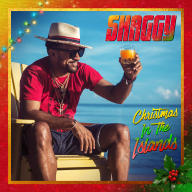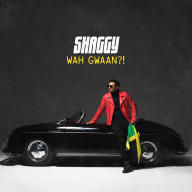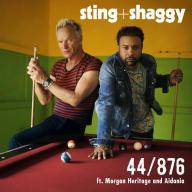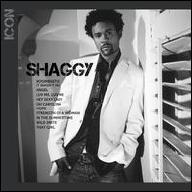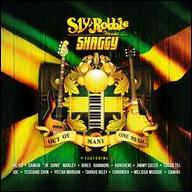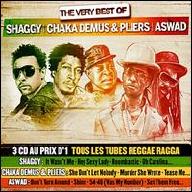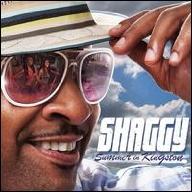Shaggy was born Orville Richard Burrell on October 22, 1968, in Kingston, Jamaica, and was nicknamed after the Scooby-Doo character. At age 18, he joined his mother in the Flatbush area of Brooklyn, New York, and soon began performing with the local Jamaican-style sound system Gibraltar Musik. A steady income proved to be a more pressing matter, however, and in 1988 Shaggy joined the Marines. Stationed at Camp Lejeune in North Carolina, he continued to pursue music in his free time, and often made the drive back to New York for recording sessions. He cut his first single, "Man a Mi Yard" b/w "Bullet Proof Buddy," at age 20 for producer Don One's own small label; for the follow-up, "Big Hood" b/w "Duppy or Uglyman," he worked with producer Lloyd Spiderman Campbell.
Shaggy's most important connection, however, proved to be radio DJ/studio engineer Sting (born Shaun Pizzonia), who got him a gig cutting dubplates at Phillip Smart's studio. One of those records, "Mampie," became a huge hit among New York reggae fans; its follow-up, "Big Up," was even more popular locally, and marked the first of several duets with Brooklyn singer Rayvon. However, Shaggy still had obligations to the military, and his budding career was interrupted by Operation Desert Storm in 1991; he was sent to Kuwait for a five-month tour of duty. After returning to Camp Lejeune, Shaggy resumed his sessions in New York, and waxed a cover of the Folkes Brothers' ska hit "Oh Carolina." Originally recorded for Prince Buster's label, the song was given a modern dancehall update complete with a prominent "Peter Gunn" sample. At first, "Oh Carolina" was simply another local hit, but thanks to some overseas promotion, it was picked up for release in the U.K. by Greensleeves in late 1992. It was an instant smash, vaulting all the way to the top of the British pop charts early the next year and doing the same in several other European countries.
"Oh Carolina" wasn't as big a hit in the U.S., where it stalled in the lower half of the charts, despite its inclusion on the hit soundtrack to the Sharon Stone film Sliver. Furthermore, its follow-up singles, the tongue-in-cheek gospel of "Soon Be Done" and the jazzy "Nice and Lovely," failed to duplicate its success. Nonetheless, the overseas success of "Oh Carolina," coupled with the high-profile Maxi Priest duet "One More Chance," was enough to land Shaggy a lucrative deal with Virgin Records. His debut album, Pure Pleasure, was released in 1993, and included many of his recent singles; the following year, Greensleeves issued a collection called Original Doberman, which covered many of his earliest recordings.
Now firmly a star in Europe, Shaggy went on to conquer the U.S. with his next album, 1995's Boombastic. The title track was an inescapable hit, selling over a million copies; it reached number three on the pop charts and number one on the R&B charts, and also became his second U.K. chart-topper. "In the Summertime," the flip side of the American single release of "Boombastic," climbed into the U.K. Top Five as a follow-up. Meanwhile, the album went platinum, nearly reaching the R&B Top Ten, and spent a full year at number one on Billboard's reggae album chart; it also won a Grammy for Best Reggae Album. A third single, "Why You Treat Me So Bad," featured guest rapper Grand Puba and nearly reached the British Top Ten in 1996 but failed to make much of an impact stateside.
Shaggy followed his breakout success with an extensive world tour, consolidating his European following, and recorded a hit duet with Maxi Priest, "That Girl," in 1996. He returned to solo action in 1997 with the Midnite Lover album. The first single, a dancehall version of Big Brother the Holding Company's "Piece of My Heart" featuring duet partner Marsha, was a relative flop in the U.S., though it had some international success. Similarly, the album was a commercial disappointment, and Virgin, assuming that Shaggy's moment had passed (as it quickly had for many of dancehall's crossover hitmakers), dropped him from its roster.
Undaunted, Shaggy turned to movie soundtracks to keep his name in the public eye. He appeared on a minor hit duet with Janet Jackson, "Luv Me, Luv Me," from the soundtrack of How Stella Got Her Groove Back in 1998, and followed it by contributing the solo cut "Hope" to For Love of the Game in 1999. By this time, Shaggy was able to land a new deal with MCA, and he rewarded them with one of the biggest-selling reggae albums ever. Released in 2000, Hot Shot started off slowly as its lead single, "Dance and Shout," flopped in the States. However, a radio DJ in Hawaii downloaded the track "It Wasn't Me" (featuring Rik Rok) from Napster and began playing it on his show. Soon it was a national hit, rocketing up the pop charts and hitting number one in early 2001; naturally, it did likewise in the U.K. and many other European countries. Its follow-up, "Angel" -- a rewrite of the country hit "Angel of the Morning," featuring Rayvon on vocals -- also went straight to number one in the U.S. and U.K. Hot Shot, meanwhile, spent six weeks at number one on the album charts and eventually sold over six million copies in the U.S. alone -- an almost unheard-of figure for a reggae release.
While Shaggy prepared his follow-up album, more pieces of product hit the market in 2002: Virgin put out Mr. Lover Lover: The Best of Shaggy, Vol. 1, a compilation covering his years at the label, while MCA issued a remix album, Hot Shot Ultramix. Before the end of the year, Shaggy released his new album, Lucky Day, which was loosely designed as a respectful tribute to womankind. Its first two singles, "Hey Sexy Lady" and "Strength of a Woman," didn't fare well in the U.S., but the album sold respectably well, going gold by year's end and charting in the Top 30 on both the pop and R&B listings. In 2005, he returned with Clothes Drop, this time on the Geffen label. Early in 2007, his "Church Heathen" single began dominating the dancehall scene thanks in part to its video starring the legendary Ninjaman as a priest. The big hit single landed on Shaggy's album Intoxication, released that same year.
His ninth album, 2011's digital-only Shaggy Friends, saw the singer collaborating with longtime pals Rayvon and RikRok, among others. A new EP, Summer in Kingston, was issued just a few months later, yielding the hit single "Sugarcane." Following a European release of what was essentially a repackaged Summer in Kingston called Rise, Shaggy revealed that he'd been collaborating with legendary producers Sly Robbie on a new project. The resulting album, Out of Many, One Music, was released in the summer of 2013. The collaborative single "Habibi (I Need Your Love)" featured a multicultural team of Shaggy, Swedish-Congolese singer Mohambi, Australian-Lebanese singer/songwriter Faydee, and Romanian singer/songwriter Costi. Sung in English, Arabic, and Spanish, the song reached number 66 on the Billboard 100 in 2015.
The diverse collaborations continued over the next year, as Shaggy appeared with Kylie Minogue, Fernando Garibay, and Mylène Farmer. Another high-profile collaboration arrived in 2018, this time with Sting. The duo issued their first single, "Don't Make Me Wait," which was included on their LP 44/876. The following year, Shaggy released the solo album Wah Gwaan?!, which featured guest spots from Jason Derulo, Nicki Jam, Shenseea, and others. Included on the album were the singles "Use Me" and "You," featuring Toronto singer Alexander Stewart. In July 2020, Shaggy celebrated the 20th anniversary of his album Hot Shot with the release of an updated version of the record called Hot Shot 2020. Included were reworked versions of the original tracks, among them a rendition of the hit "It Wasn't Me" featuring Rayvon. ~ Steve Huey, Rovi
|
1
|
|
Angel |
|
2
|
|
It Wasn't Me |
|
3
|
|
Oh Carolina |


